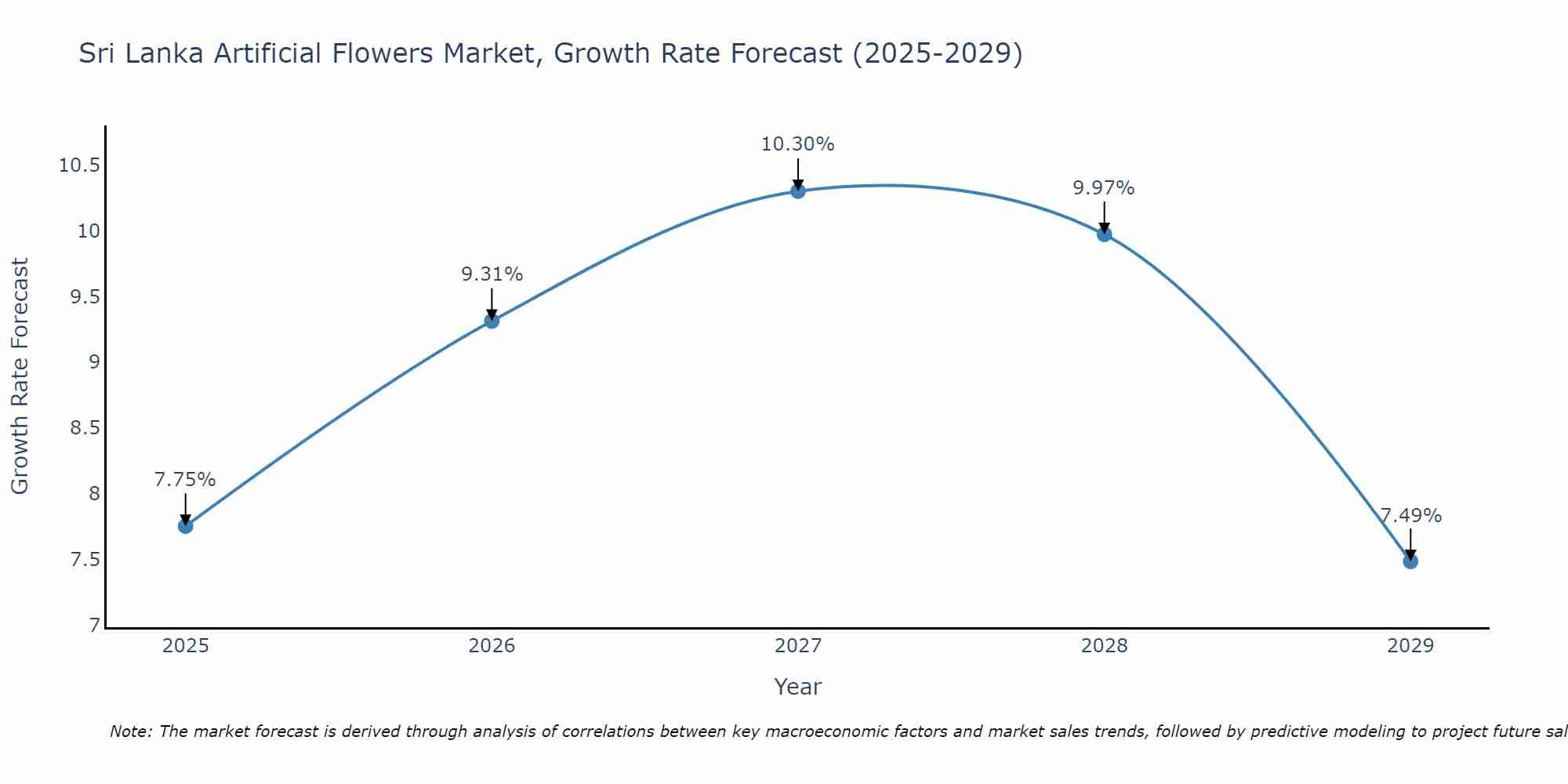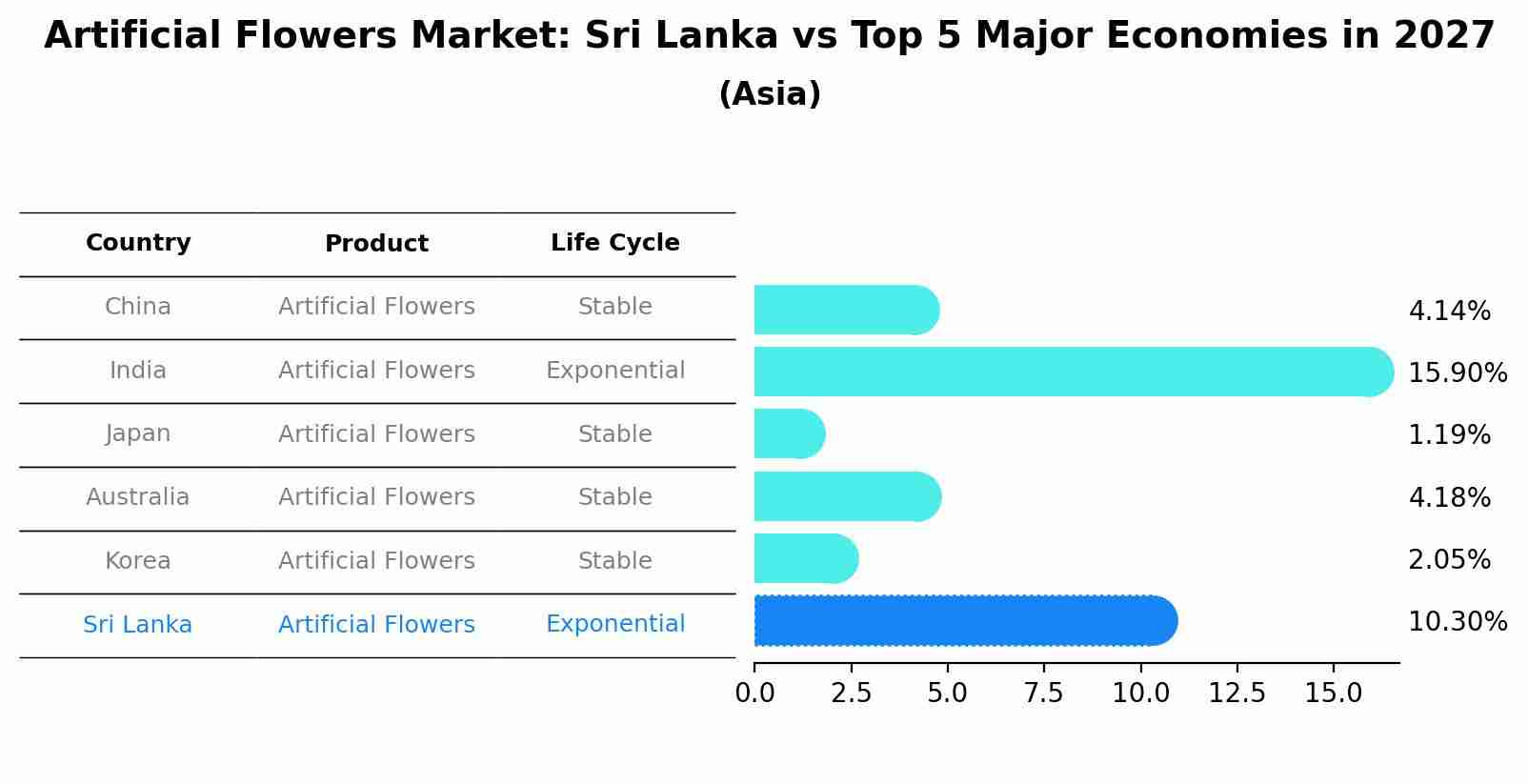Sri Lanka Artificial Flowers Market Outlook | Share, Analysis, Growth, Revenue, COVID-19 IMPACT, Size, Trends, Forecast, Industry, Value & Companies
| Product Code: ETC380191 | Publication Date: Aug 2022 | Updated Date: Jul 2025 | Product Type: Market Research Report | |
| Publisher: 6Wresearch | Author: Vasudha | No. of Pages: 75 | No. of Figures: 35 | No. of Tables: 20 |
Sri Lanka Artificial Flowers Market Size Growth Rate
The Sri Lanka Artificial Flowers Market is projected to witness mixed growth rate patterns during 2025 to 2029. The growth rate begins at 7.75% in 2025, climbs to a high of 10.30% in 2027, and moderates to 7.49% by 2029.

Artificial Flowers Market: Sri Lanka vs Top 5 Major Economies in 2027 (Asia)
The Artificial Flowers market in Sri Lanka is projected to grow at a high growth rate of 10.30% by 2027, within the Asia region led by China, along with other countries like India, Japan, Australia and South Korea, collectively shaping a dynamic and evolving market environment driven by innovation and increasing adoption of emerging technologies.

Sri Lanka Artificial Flowers Market Synopsis
The Sri Lanka Artificial Flowers Market is witnessing a significant growth trajectory driven by factors such as increasing demand for low-maintenance and long-lasting decorative items, along with a rise in the popularity of artificial flowers for gifting purposes. The market offers a wide range of artificial flowers made from various materials such as silk, plastic, and paper, catering to diverse consumer preferences. With a growing trend towards interior decoration and event styling, artificial flowers are being increasingly used in homes, offices, hotels, and event venues across Sri Lanka. Additionally, the market is supported by the availability of a variety of designs, colors, and arrangements, providing customers with ample choices to suit their specific needs and preferences. The competitive landscape includes both local manufacturers and international players, contributing to a dynamic and evolving market environment.
Sri Lanka Artificial Flowers Market Trends
The Sri Lanka Artificial Flowers Market is currently experiencing a surge in demand for high-quality silk and real-touch artificial flowers that closely mimic the appearance of fresh flowers. Consumers are increasingly looking for long-lasting and low-maintenance floral décor options for their homes, events, and businesses. There is also a growing preference for eco-friendly and sustainable artificial flowers made from recycled materials. Additionally, there is a trend towards customization and personalization, with consumers seeking unique and bespoke artificial floral arrangements. Online retail channels are becoming increasingly popular for purchasing artificial flowers, providing convenience and a wide range of options for buyers. Overall, the market is witnessing a shift towards premium, realistic-looking artificial flowers that offer durability and aesthetic appeal.
Sri Lanka Artificial Flowers Market Challenges
In the Sri Lanka Artificial Flowers Market, some challenges faced include competition from lower-priced imported products, fluctuations in raw material costs, and the need to educate consumers on the quality and longevity of artificial flowers compared to real ones. Additionally, the market may also face issues related to limited distribution channels and lack of awareness about the variety and designs available in artificial flowers. Developing innovative and unique product offerings, establishing strong partnerships with retailers, and implementing effective marketing strategies to differentiate from low-quality imports are essential for market players to overcome these challenges and thrive in the Sri Lankan Artificial Flowers Market.
Sri Lanka Artificial Flowers Market Investment Opportunities
In the Sri Lanka artificial flowers market, there are several investment opportunities available for potential investors. With the increasing demand for artificial flowers in various sectors such as home decor, event planning, and hospitality, there is a growing market for high-quality, realistic artificial flower products. Investing in manufacturing facilities that produce innovative and lifelike artificial flowers could be a lucrative opportunity. Additionally, investing in online retail platforms that specialize in artificial flowers can tap into a wider consumer base both domestically and internationally. Another potential investment avenue could be in developing sustainable and eco-friendly artificial flower products to cater to the growing environmentally conscious consumer market. Overall, the Sri Lanka artificial flowers market presents diverse investment opportunities for those looking to capitalize on the increasing demand for artificial floral products.
Jordan Agar Market Government Policies
The Sri Lankan government has implemented various policies impacting the artificial flowers market, including regulations on imports and exports, taxation, and environmental standards. Import duties on artificial flowers may affect the competitiveness of local manufacturers, while export regulations can influence market access. Additionally, tax policies such as Value Added Tax (VAT) and income tax rates can impact production costs and consumer pricing. Environmental standards imposed by the government may also affect the materials and production processes used in the artificial flowers market. Overall, government policies play a crucial role in shaping the operating environment for businesses in the Sri Lankan artificial flowers market, influencing aspects such as competition, pricing, and sustainability practices.
Sri Lanka Artificial Flowers Market Future Outlook
The Sri Lanka Artificial Flowers Market is poised for steady growth in the coming years due to various factors such as increasing consumer preference for low-maintenance home décor options, growing demand for artificial flowers in events and weddings, and the rising popularity of artificial plants in commercial spaces. Additionally, the market is benefiting from advancements in technology that have led to the development of high-quality, realistic-looking artificial flowers that closely mimic their natural counterparts. As the market continues to expand, manufacturers are expected to focus on sustainable and eco-friendly production practices to meet the growing demand from environmentally-conscious consumers. Overall, the future outlook for the Sri Lanka Artificial Flowers Market appears promising, with opportunities for innovation and growth in both the residential and commercial sectors.
Key Highlights of the Report:
- Sri Lanka Artificial Flowers Market Outlook
- Market Size of Sri Lanka Artificial Flowers Market, 2021
- Forecast of Sri Lanka Artificial Flowers Market, 2031
- Historical Data and Forecast of Sri Lanka Artificial Flowers Revenues & Volume for the Period 2018 - 2031
- Sri Lanka Artificial Flowers Market Trend Evolution
- Sri Lanka Artificial Flowers Market Drivers and Challenges
- Sri Lanka Artificial Flowers Price Trends
- Sri Lanka Artificial Flowers Porter's Five Forces
- Sri Lanka Artificial Flowers Industry Life Cycle
- Historical Data and Forecast of Sri Lanka Artificial Flowers Market Revenues & Volume By Material Type for the Period 2018 - 2031
- Historical Data and Forecast of Sri Lanka Artificial Flowers Market Revenues & Volume By Clay & Porcelain for the Period 2018 - 2031
- Historical Data and Forecast of Sri Lanka Artificial Flowers Market Revenues & Volume By Cotton & Silk for the Period 2018 - 2031
- Historical Data and Forecast of Sri Lanka Artificial Flowers Market Revenues & Volume By Leather & Nylon for the Period 2018 - 2031
- Historical Data and Forecast of Sri Lanka Artificial Flowers Market Revenues & Volume By Paper & Wax for the Period 2018 - 2031
- Historical Data and Forecast of Sri Lanka Artificial Flowers Market Revenues & Volume By Plastic & Polyester for the Period 2018 - 2031
- Historical Data and Forecast of Sri Lanka Artificial Flowers Market Revenues & Volume By Application for the Period 2018 - 2031
- Historical Data and Forecast of Sri Lanka Artificial Flowers Market Revenues & Volume By Commercial for the Period 2018 - 2031
- Historical Data and Forecast of Sri Lanka Artificial Flowers Market Revenues & Volume By Residential for the Period 2018 - 2031
- Sri Lanka Artificial Flowers Import Export Trade Statistics
- Market Opportunity Assessment By Material Type
- Market Opportunity Assessment By Application
- Sri Lanka Artificial Flowers Top Companies Market Share
- Sri Lanka Artificial Flowers Competitive Benchmarking By Technical and Operational Parameters
- Sri Lanka Artificial Flowers Company Profiles
- Sri Lanka Artificial Flowers Key Strategic Recommendations
Frequently Asked Questions About the Market Study (FAQs):
- Single User License$ 1,995
- Department License$ 2,400
- Site License$ 3,120
- Global License$ 3,795
Search
Thought Leadership and Analyst Meet
Our Clients
Related Reports
- Canada Oil and Gas Market (2026-2032) | Share, Segmentation, Value, Industry, Trends, Forecast, Analysis, Size & Revenue, Growth, Competitive Landscape, Outlook, Companies
- Germany Breakfast Food Market (2026-2032) | Industry, Share, Growth, Size, Companies, Value, Analysis, Revenue, Trends, Forecast & Outlook
- Australia Briquette Market (2025-2031) | Growth, Size, Revenue, Forecast, Analysis, Trends, Value, Share, Industry & Companies
- Vietnam System Integrator Market (2025-2031) | Size, Companies, Analysis, Industry, Value, Forecast, Growth, Trends, Revenue & Share
- ASEAN and Thailand Brain Health Supplements Market (2025-2031) | Strategy, Consumer Insights, Analysis, Investment Trends, Opportunities, Growth, Size, Share, Industry, Revenue, Segments, Value, Segmentation, Supply, Forecast, Restraints, Outlook, Competition, Drivers, Trends, Demand, Pricing Analysis, Competitive, Strategic Insights, Companies, Challenges
- ASEAN Bearings Market (2025-2031) | Strategy, Consumer Insights, Analysis, Investment Trends, Opportunities, Growth, Size, Share, Industry, Revenue, Segments, Value, Segmentation, Supply, Forecast, Restraints, Outlook, Competition, Drivers, Trends, Demand, Pricing Analysis, Competitive, Strategic Insights, Companies, Challenges
- Europe Flooring Market (2025-2031) | Outlook, Share, Industry, Trends, Forecast, Companies, Revenue, Size, Analysis, Growth & Value
- Saudi Arabia Manlift Market (2025-2031) | Outlook, Size, Growth, Trends, Companies, Industry, Revenue, Value, Share, Forecast & Analysis
- Uganda Excavator, Crane, and Wheel Loaders Market (2025-2031) | Strategy, Consumer Insights, Analysis, Investment Trends, Opportunities, Growth, Size, Share, Industry, Revenue, Segments, Value, Segmentation, Supply, Forecast, Restraints, Outlook, Competition, Drivers, Trends, Demand, Pricing Analysis, Competitive, Strategic Insights, Companies, Challenges
- Rwanda Excavator, Crane, and Wheel Loaders Market (2025-2031) | Strategy, Consumer Insights, Analysis, Investment Trends, Opportunities, Growth, Size, Share, Industry, Revenue, Segments, Value, Segmentation, Supply, Forecast, Restraints, Outlook, Competition, Drivers, Trends, Demand, Pricing Analysis, Competitive, Strategic Insights, Companies, Challenges
Industry Events and Analyst Meet
Whitepaper
- Middle East & Africa Commercial Security Market Click here to view more.
- Middle East & Africa Fire Safety Systems & Equipment Market Click here to view more.
- GCC Drone Market Click here to view more.
- Middle East Lighting Fixture Market Click here to view more.
- GCC Physical & Perimeter Security Market Click here to view more.
6WResearch In News
- Doha a strategic location for EV manufacturing hub: IPA Qatar
- Demand for luxury TVs surging in the GCC, says Samsung
- Empowering Growth: The Thriving Journey of Bangladesh’s Cable Industry
- Demand for luxury TVs surging in the GCC, says Samsung
- Video call with a traditional healer? Once unthinkable, it’s now common in South Africa
- Intelligent Buildings To Smooth GCC’s Path To Net Zero


















